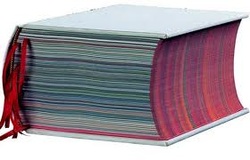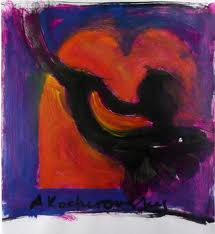
Submission
Days of
inscription
of submission
before
God bent
Back curved
as a comma,
or an end
quotation
mark…”
Having spoken
having scrawled
the letters of our lives
on claf, cow hide
All have bent
ink black nights
over their works
- Writing with dead lines
We submit
rough draft in
trembling claw
Having carved out of stone
Cumbersome Tablets
Of a twelve month tale
Days of Awetobiographic awe
Lapping up a page
of whiteness
With a pin’s thirsty tip
Sent to press
the Book of Life
encyclopedic
voluminous
Each name
a manuscript
of events
sins scribbled like a
stowaway writing
wishes from the bowels
of a bottom-born ship
- or praises poured like
honey to mask
the poison of the dish
All of us in need of
a good editor
to make structural
emendations
spelling
corrections, verb
replacements
For a life lived
in stream of conscious
must be crafted
by master’s fingers,
opposing thumbs
into something well
worth reading
when at last
the year is done
So, pray, let us write a
masterpiece
let us be published
in the world
to come
*
Commentary & Exercises: This is a poem which plays with the richly symbolic metaphor of writing that punctuates our High Holiday liturgy and experience. God the Writer: God is not just a creator or an orator. God is a writer, scribbling notes about our lives in cosmic journals…and then once a year – with utmost seriousness - inscribing our names, hopefully, in the Book of Life.
And we too are writers. The authors of our actions. Indeed, we are all struggling writers; scrawling out our books (of life) – hoping they will be found acceptable, i.e. publishable, in the eyes of the divine. Just as writers struggle to write a powerful piece, we are all struggling to live powerfully, eloquently.
Editing as a form of Teshuva:
Thus, to carry this metaphor forward, the image of editing becomes expressive of the ‘teshuva’ process. For essentially editing is a process of going over what you have done and fixing the mistakes as best you can. Yes, the essence of the piece of work/of the year, will remain the same, but glaring mistakes and problems in the ‘text’ can be smoothed out by a good editing job, ie teshuva - doing conscientious review and repentance. Teshuva becomes an action of spiritual re-writing.
The Two Sides of ‘Submission’:
The title “Submission” captures the dual meaning of the word -- submitting oneself to a higher power or system submitting one’s work (to a publisher or critic)/and submitting one’s life to be reviewed by God.
Of course, in our modern world of autonomy and empowerment, the word ‘submission’ grates at our egalitarian ears. And yet the idea of submitting to God or to social/tribal rules is one of the main themes of traditional Judaism. The crowning refrain of the High Holidays is that of declaring God as our King. And of course a King is one to whom we necessarily submit. Thus, the title “Submission” at once evokes and softens the traditional notion of ‘submitting’ to God. It is not just that we are submitting ourselves to an authority, but we are submitting our work/our lives/our creativity to be reviewed by God, the publisher, the mentor, the teacher.
Writual exercise: Teshuva/Editing exercise
One of the main themes of Rosh Hashana is rememberance (zikronot). We utilize memory as a tool of teshuva. We reflect on the past year and in so doing we can, to an extent, recreate it.
Step 1: Think back on the year. Write about the year that is finishing. (Note - use black or blue ink pen). Focus specifically on what you did that you wish you hadn’t; that you wish had gone differently. Write a few paragraphs. Be honest, even brutally honest. Recognizing our mistakes is essential to the teshuva process.
Step 2: Once you have lamented over them sufficiently, take a red pen in your hand – literally. With that pen go over the page and change the verbs. Fix…edit…them. Be imaginative, be daring.
A simple example: If you had written, “I ate so much,” change the ‘ate’ to ‘prayed’…. Thus creating, “I prayed so much.” - Or whatever your preferred verb would be.
Next fix the adjectives, adverbs, nouns, etc. Or add new ones.
This is the point of teshuva…that our deeds are written in erasable script. We can go back and edit and transform the piece. Teshuva is like pressing ‘Select All’ on the computer screen and changing the font or size of the entire word file…all in one elegant movement.
Exercise 2 - Recommendation Letter: Write to God a recommendation letter for why you think that your piece/ ie your year…should be accepted in to the “Book of Life Anthology”. Praise your piece/your year. Accentuate the good you have done. Be as convincing as possible. Tell how much tzedaka you gave…recount that time you spent 45 minutes listening compassionately to the kvetching of the elderly lady down the street, for the twelfth time, etc.
Step 2: If you're doing this exercise with a group: Each participant puts their writings in an envelope, self-addressed. Mention how the official teshuva period stretches all the way to Hannukah, when the final final sealing of the book of life happens. Mail these pages back to their author right before Hannukah so that they can be reminded of the process, feel the power of the holiday cycle and see how they are doing in their new year.

Rosh Hashanah Poem #2:
Regarding Confessions...
Read crime-in-all
not criminal
ours to contain
ours to dissolve
let's sentence self
til spoken right
lest one hand stab
the other in spite
in spite of self
and body same
your cripple
crafts the other’s maim
The convict with conviction calls
“We are a chain
En-chained to all”
“And I myself will not be free
Til jury sees its injury”
“And I’ll not give a guilty plea
Til Judge confess
His Culpability”
*
Poem 3:
For the sins I have committed
For the way I drag my feet
when you beckon
turn deaf and blind
before the begging
the way I rip my hands with my fingers
my words with my teeth
the way I step on my feet
the way I narrate
the darkness just a shade darker
when you're not looking at me
the way I work into a worm hole
and dig deep
the way I eye my 'me'
so suspiciously
the way I blame
and batter you
when we oversleep
the way I stomp like a steed
and shatter like stained glass
the way I fume
and fake
the way I steal
the way I stash
the way I swipe pennies
from the pockets of truthful men
the way I covet the gifted
the way I crave
the thin
the way I forget names
the way I feast
the way I charge you double for
every good deed
the way I pick and chose what I want to see
the way I harden like gum
the way I always either
slacken or cleave
for all the ways
I have misdone my deeds
Sliced through my sleeves
For all the ways I have hurt thee
Count them, not against,
but come, and simply
- count them with me
Poem 4:
Av Harachaman*
“Father of wombs"
We wail
at the waxing moon
- And a merciful mother he be -
Like the open casket
of the aron hakodesh
That delivers our scroll in her
soft swaddled sheath
We call it our teacher
And yet carry it like a babe
Born from our heavenly father
And yet Handmaid
Someone once said a gentle man
Was a contradiction in terms
But a “wombing father”
- Now that’s progressive
for a couple of ancient
hebrew words
*Av Harachaman is the term used in the liturgy for “Merciful father” but can also be read with much poetic license as 'the womb(rechem)-full father'

 RSS Feed
RSS Feed
